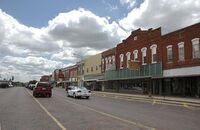Difference between revisions of "NRHP: Tecumseh Architectural District"
(Created page with "Tecumseh Architectural District ==Tecumseh Architectural Dist...") |
|||
| Line 3: | Line 3: | ||
==Tecumseh Architectural District == | ==Tecumseh Architectural District == | ||
| − | NRHP Reference #: 75001095 | + | NRHP Reference #: [https://npgallery.nps.gov/AssetDetail/NRIS/75001095 75001095] |
NRHP Listing Date: 19750620 | NRHP Listing Date: 19750620 | ||
Latest revision as of 07:41, 23 February 2018
Contents
Tecumseh Architectural District
NRHP Reference #: 75001095
NRHP Listing Date: 19750620
Location
bounded by Atchison, Nebr RR, 2nd, Wash. & 7th, Tecumseh, Johnson County, Nebraska
View this property's location
View all NRHP properties on this map.
Summary
Overlooking the north fork of the Big Nemaha River in southeast Nebraska's Drift Hills region, Tecumseh has been the county seat of Johnson County since the county's organization in 1856-57. The Tecumseh Architectural District is a fine example of a late nineteenth century county seat town in Nebraska. A wide range of important building types and building materials exist in the approximately fifty square blocks of the district. The 1888-89 courthouse, a two-story brick and stone building designed by Lincoln architect William Gray in the County Capitol form, is the pivotal structure. Also included is the Tecumseh Opera House, a two-story brick building constructed in 1880 by W. R. Spicknell and W. H. Hassett.
Further Information
Bibliography
About the National Register of Historic Places
The National Register of Historic Places (NRHP) is the country’s official list of historically significant properties. To be eligible for the NRHP a property must generally retain their historic appearance, be at least 50 years old, and have the potential to be documented as historically or architecturally significant at either the local, state, or national level. The National Register of Historic Places is a National Park Service program administered by the Nebraska State Historical Society for the state of Nebraska. Visit the Nebraska State Historical Society's website to learn more about the program.
